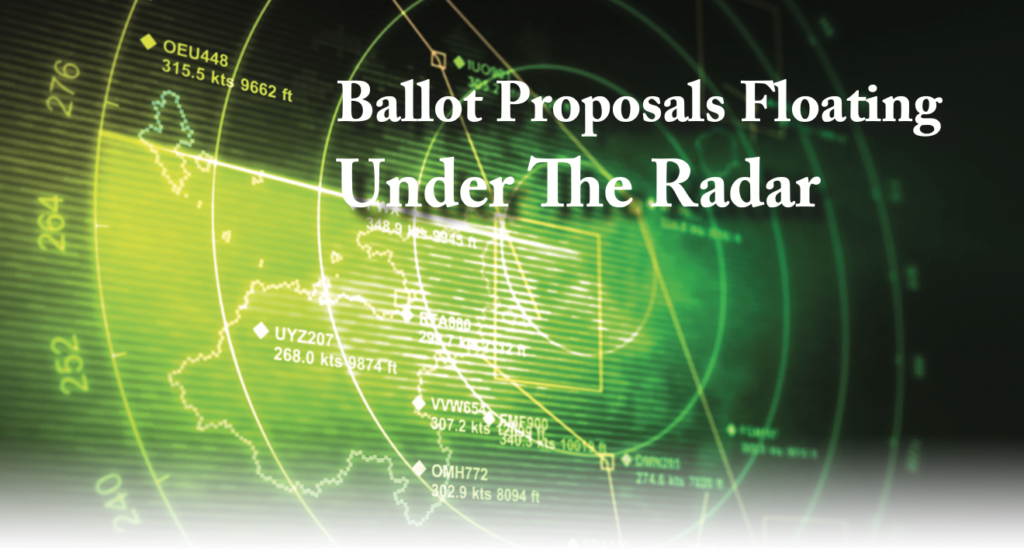There are proposals on this year’s ballot that have been floating under the radar. Here is a summary of what they are and pro and con arguments for each.
Redistricting
Question as it Will Appear on Ballot: This proposed constitutional amendment would freeze the number of state senators at 63, amend the process for the counting of the state’s population, delete certain provisions that violate the United States Constitution, repeal and amend certain requirements for the appointment of the co-executive directors of the redistricting commission and amend the manner of drawing district lines for congressional and state legislative offices.
Pro Arguments:
• The current New York State law requiring incarcerated individuals to be counted as living in their last place of residence, and not prison, for purposes of redistricting would be constitutionalized.
• In case the Federal Census fails to include non-citizen and Native American residents in its count, New York State would be required to count them for purposes of redistricting.
Con Arguments:
• The proposed amendment would unfairly empower the majority party by preventing the minority party from having input into the final proposed maps.
• The amendment repeals the special legislative voting rules in place in case one party controls both legislative houses, which require plans to be approved by at least two-thirds of the members of each house. Instead, a simple majority will be needed to approve the commission’s plans, or a 60% majority if the commission is unable to obtain seven votes to approve a redistricting plan on time.
• The amendment takes away the voting rights of minority party-appointed commission members in appointing the two co-executive directors of the commission.
• The proposed amendment significantly reduces the role of the commission in the entire process. Proposed subdivision (g-1) of section five-b provides that if the commission does not reach a decision by November 1, 2021, its draft plans will be submitted to the Legislature that can then (according to proposed changes to section four-b) introduce its own redistricting plans.
Environment
Question as it Will Appear on Ballot: The proposed amendment to Article 1 of the New York Constitution would establish the right of each person to clean air and water and a healthful environment.
Pro Arguments:
• This amendment will require state and local governments and businesses to consider the environment and its citizens’ relationship to it in all decision making.
• Advocates in favor of the amendment believe it will create a mechanism for combating environmental racism and rebalancing the inequities communities of color and low-income communities face from disproportionate exposure to pollution and other environment-harming practices.
• Forty-three states have some form of expression of environmental values in their Constitutions; but only Montana and Pennsylvania have recognized protecting environmental rights as an unchallengeable right, putting environmental rights on par with other political and civil liberties. New York would be the third state to adopt this measure.
Con Arguments:
• The amendment’s broad language could lead to complications, including frivolous lawsuits against companies with facilities sited under existing environmental rules.
• The amendment’s general wording gives great flexibility to the New York courts to interpret and apply the provisions. More details regarding
enforcement and definitions, duties and obligations related to
environmental rights are required.
• Courts could require NY cities and counties to make expensive changes
to brick & mortar facilities, or to move, or renovate them. It could be called another “Unfunded Mandate.”
Voter Registration
Question as it Will Appear on Ballot: The proposed amendment would delete the current requirement in Article 2, § 5 that a citizen be registered to vote at least ten days before an election and would allow the Legislature to enact laws permitting a citizen to register to vote less than ten days before the election. Shall the proposed amendment be approved?
Pro Arguments:
• More voters will be enfranchised by shortening or eliminating the deadline
to register to vote.
• This proposal would allow the Legislature to implement same-day voter registration. Twenty states currently allow for same-day voter registration.
• Same-day registration can increase voter turnout and participation by
ensuring all eligible voters can cast their ballot.
• On election day voter rolls can be updated and corrected allowing eligible
voters who have moved, or been removed in error from the official rolls, to update their registration records.
Con Arguments:
• Should same-day voter registration be implemented after passage of this amendment, election officials may have difficulty determining how many ballots are needed at each poll site.
• Implementing same-day voter registration has the potential to allow for in-person election fraud if a voter illegally registers at multiple sites and votes.
Absentee Ballots
Question as it Will Appear on Ballot: The proposed amendment would delete from the current provision on absentee ballots the requirement that an absentee voter must be unable to appear at the polls by reason of absence from the county or illness or physical disability.
Pro Arguments:
• Any voter would have the ability to request an absentee ballot for a primary and/or general election thereby increasing voter access to elections.
• Absentee voting was heavily utilized during the COVID-19 pandemic.
Removing the cause for requesting an absentee ballot would ensure voters
can request to vote by absentee ballot should another pandemic occur.
• Thirty-four states and Washington, D.C., do not require an excuse from
those who wish to vote absentee or by mail.
• Has the potential to take pressure off poll sites by reducing the
number of in-person voters.
Con Arguments:
• The proposed amendment would provide less protection against potential absentee ballot voter fraud. The number of absentee ballots would increase, but the proposed amendment offers no suggestions for increasing protection against potential fraud.
• There is potential for loss of anonymity with more absentee voting.
• Additional reliance on absentee voting can slow election results
and reporting.
• An increase in absentee voting can cost municipalities additional money
for printing of ballots, envelopes, and for postage.
• The civic experience of voting with neighbors at a local school, church,
or other polling place no longer exists.
Civil Court Jurisdiction
Question as it Will Appear on Ballot: The proposed amendment would increase the New York City Civil Court’s jurisdiction by allowing it to hear and decide claims for up to $50,000 instead of the current jurisdictional limit of $25,000. Shall the proposed amendment be approved?
Pro Arguments:
• In 1983, the Constitution was amended to raise the jurisdictional limit of the New York City Civil Court from claims of $10,000 to $25,000, where it has remained. This was done to adjust for inflation, and to help lift a burden off of a backlogged New York State Supreme Court. This proposal will raise the jurisdictional limit of New York City Civil Court to $50,000.
• This proposal will reduce backlogs and delays by relieving some of the burden placed on New York Supreme Court judges who hear civil cases with claims above $25,000.
Con Arguments:
• The Civil Court of the City of New York consists of 3 Parts: General Civil, Housing, and Small Claims. General Civil cases include matters where parties are seeking monetary relief up to $25,000. The Housing Part hears landlord-tenant matters and cases involving maintenance of housing standards. The Small Claims Part hears cases where parties are seeking monetary relief up to $10,000. This proposal may place an additional burden on the New York City Civil Court by increasing the number of cases they may receive.



